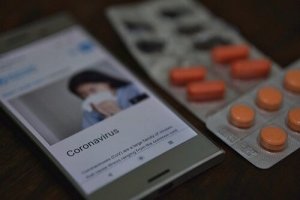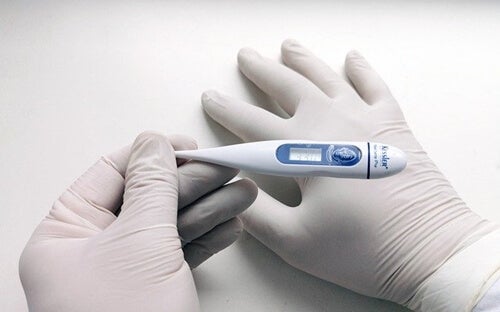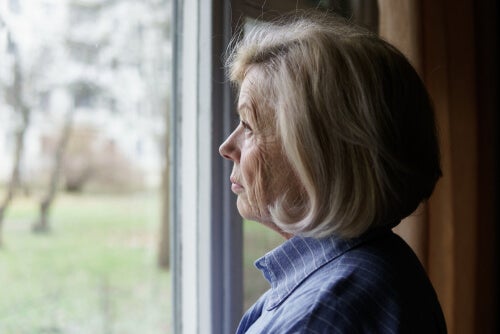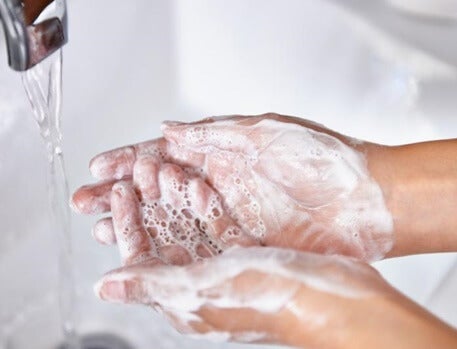What Should We Do if a Loved One Gets COVID-19?


Written and verified by the psychologist Valeria Sabater
The coronavirus pandemic is not only altering our lifestyle, it’s also raising difficult questions. One of them is how we should act if a loved one gets COVID-19. In crisis situations, there are three exceptional tools that you should always keep in mind: accurate information, personal responsibility, and calm. With these three great allies, it’s easier to cope with the situation at hand.
First of all, the most relevant thing is to know the action protocol for your particular country. The health organizations of most countries have set up specific telephone lines to provide information and to contact your health center or hospital if you have symptoms. Of course, these phone lines will be very busy, but you should keep trying in order to be attended to.
The number of operators who can attend to you is being increased, and you should always have the appropriate number at hand for whenever you should need it.
In the meantime, it’s advisable to try to lead as normal a life as possible, by taking adequate hygiene and protection measures and limiting social interaction as much as possible.

Here are the guidelines we should follow in case a family member or someone close to us gets infected with COVID-19.
How to act if a loved one is infected with COVID-19
The world map of the coronavirus reflects a clear reality. We currently have over 140,000 cases of infection in 124 countries, and this is going up by the second. As we write this, Italy has one of the most worrying outbreaks, with Spain close behind.
The good news is that China has managed to contain the outbreak and has now closed the vast majority of the field hospitals it had set up to handle the emergency. It’s now taking action to assist Italy with medical supplies and medical experts.
We know, therefore, that the disease can be stopped, but to do so we must apply individual responsibility to contain the number of those infected, to avoid hospital collapse, and, most importantly, to protect the population at risk.
But back to the question in hand: how to act if a loved one is infected by COVID-19?

What to do when a loved one gets infected with COVID-19
One thing to keep in mind first is that, in 80% of cases, the coronavirus has mild symptoms:
- Dry cough
- A feeling of shortness of breath
- Fever
- Muscle pain and general malaise
- Sore throat
- Rhinorrhea
The vast majority can recover at home without any specific treatment. You must suffer the illness in your own home and take the appropriate hygiene measures.
However, it’s important to pay specific attention to the population at greatest risk, for whom COVID-19 can be very serious. These would be people with the following characteristics:
- Elderly people
- Immunosuppressed patients (with low defenses)
- Patients with chronic diseases
- People with diabetes
- Patients with heart problems
- People with functional diversity
In these cases, the health organizations will be the ones to assess the admission of our family member to a hospital.
What should I do if my relative gets COVID-19?
When someone close to you has tested positive for COVID-19, it’s normal for you to feel uneasy. However, you must remain calm.
You should only call the emergency services numbers if your relative has clear COVID-19 symptoms. The next step will be to completely isolate at home wait for the health workers to come to our home to carry out the test.
If you or the person concerned doesn’t show any symptoms associated with the coronavirus, then the guidelines are to lead a normal life and follow preventive and precautionary measures.
If you live in the same house as the sick relative, then you’ll have to carry out the following recommended guidelines.
A loved one is infected with COVID-19: home guidelines
We’ll insist again that, if your family member doesn’t belong to any of the at-risk groups mentioned earlier, then they should get over the illness at home without any major problems.
- You’ll need to carry out an isolation period in your home of 14 days.
- The sick person must have their own room. As far as possible, they should have an exclusive bathroom. If there’s only one bathroom in the house, it should be cleaned with bleach after each use.
- The room should be well-ventilated and sunlit if possible. Your relative should have a cellphone at all times.
- They must also have an airtight rubbish bin where they can throw their tissues or other waste.
- When the sick relative leaves the room, they should wear a mask. They should also establish a minimum distance of two meters from other people in the home. They should always wash their hands with soap frequently, as should all the other members of the household.
- Likewise, you should also clean the home frequently with water and bleach. It’s important to wash all surfaces, not forgetting handles, knobs, computer surfaces, armchairs, chairs, etc. You should wash kitchen utensils and cutlery with hot water.
- On top of this, you should also wash the patient’s clothes separately, at a high temperature.

How to know if your loved one is clear of COVID-19
The home quarantine lasts 14 days. In more than 80% of the cases, there won’t be any problems. To find out if the person is free of the virus, health workers can carry out two tests in a 24-hour interval. If both tests are negative, then the disease has been overcome.
One important piece of information is that there’s no scientific evidence to say that a person who’s had COVID-19 can’t have a relapse. We should remain calm and always trust our doctors.
In conclusion, if someone you love is infected with COVID-19, don’t panic. There’s a protocol and we must comply with it, the vast majority of people face the illness normally and the number of people discharged from hospitals every day is increasingly encouraging. We can be confident that we’ll get through this together.
The coronavirus pandemic is not only altering our lifestyle, it’s also raising difficult questions. One of them is how we should act if a loved one gets COVID-19. In crisis situations, there are three exceptional tools that you should always keep in mind: accurate information, personal responsibility, and calm. With these three great allies, it’s easier to cope with the situation at hand.
First of all, the most relevant thing is to know the action protocol for your particular country. The health organizations of most countries have set up specific telephone lines to provide information and to contact your health center or hospital if you have symptoms. Of course, these phone lines will be very busy, but you should keep trying in order to be attended to.
The number of operators who can attend to you is being increased, and you should always have the appropriate number at hand for whenever you should need it.
In the meantime, it’s advisable to try to lead as normal a life as possible, by taking adequate hygiene and protection measures and limiting social interaction as much as possible.

Here are the guidelines we should follow in case a family member or someone close to us gets infected with COVID-19.
How to act if a loved one is infected with COVID-19
The world map of the coronavirus reflects a clear reality. We currently have over 140,000 cases of infection in 124 countries, and this is going up by the second. As we write this, Italy has one of the most worrying outbreaks, with Spain close behind.
The good news is that China has managed to contain the outbreak and has now closed the vast majority of the field hospitals it had set up to handle the emergency. It’s now taking action to assist Italy with medical supplies and medical experts.
We know, therefore, that the disease can be stopped, but to do so we must apply individual responsibility to contain the number of those infected, to avoid hospital collapse, and, most importantly, to protect the population at risk.
But back to the question in hand: how to act if a loved one is infected by COVID-19?

What to do when a loved one gets infected with COVID-19
One thing to keep in mind first is that, in 80% of cases, the coronavirus has mild symptoms:
- Dry cough
- A feeling of shortness of breath
- Fever
- Muscle pain and general malaise
- Sore throat
- Rhinorrhea
The vast majority can recover at home without any specific treatment. You must suffer the illness in your own home and take the appropriate hygiene measures.
However, it’s important to pay specific attention to the population at greatest risk, for whom COVID-19 can be very serious. These would be people with the following characteristics:
- Elderly people
- Immunosuppressed patients (with low defenses)
- Patients with chronic diseases
- People with diabetes
- Patients with heart problems
- People with functional diversity
In these cases, the health organizations will be the ones to assess the admission of our family member to a hospital.
What should I do if my relative gets COVID-19?
When someone close to you has tested positive for COVID-19, it’s normal for you to feel uneasy. However, you must remain calm.
You should only call the emergency services numbers if your relative has clear COVID-19 symptoms. The next step will be to completely isolate at home wait for the health workers to come to our home to carry out the test.
If you or the person concerned doesn’t show any symptoms associated with the coronavirus, then the guidelines are to lead a normal life and follow preventive and precautionary measures.
If you live in the same house as the sick relative, then you’ll have to carry out the following recommended guidelines.
A loved one is infected with COVID-19: home guidelines
We’ll insist again that, if your family member doesn’t belong to any of the at-risk groups mentioned earlier, then they should get over the illness at home without any major problems.
- You’ll need to carry out an isolation period in your home of 14 days.
- The sick person must have their own room. As far as possible, they should have an exclusive bathroom. If there’s only one bathroom in the house, it should be cleaned with bleach after each use.
- The room should be well-ventilated and sunlit if possible. Your relative should have a cellphone at all times.
- They must also have an airtight rubbish bin where they can throw their tissues or other waste.
- When the sick relative leaves the room, they should wear a mask. They should also establish a minimum distance of two meters from other people in the home. They should always wash their hands with soap frequently, as should all the other members of the household.
- Likewise, you should also clean the home frequently with water and bleach. It’s important to wash all surfaces, not forgetting handles, knobs, computer surfaces, armchairs, chairs, etc. You should wash kitchen utensils and cutlery with hot water.
- On top of this, you should also wash the patient’s clothes separately, at a high temperature.

How to know if your loved one is clear of COVID-19
The home quarantine lasts 14 days. In more than 80% of the cases, there won’t be any problems. To find out if the person is free of the virus, health workers can carry out two tests in a 24-hour interval. If both tests are negative, then the disease has been overcome.
One important piece of information is that there’s no scientific evidence to say that a person who’s had COVID-19 can’t have a relapse. We should remain calm and always trust our doctors.
In conclusion, if someone you love is infected with COVID-19, don’t panic. There’s a protocol and we must comply with it, the vast majority of people face the illness normally and the number of people discharged from hospitals every day is increasingly encouraging. We can be confident that we’ll get through this together.
This text is provided for informational purposes only and does not replace consultation with a professional. If in doubt, consult your specialist.







